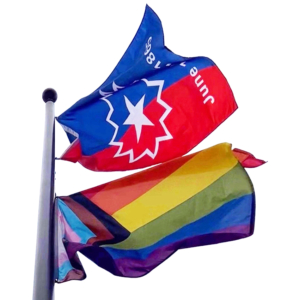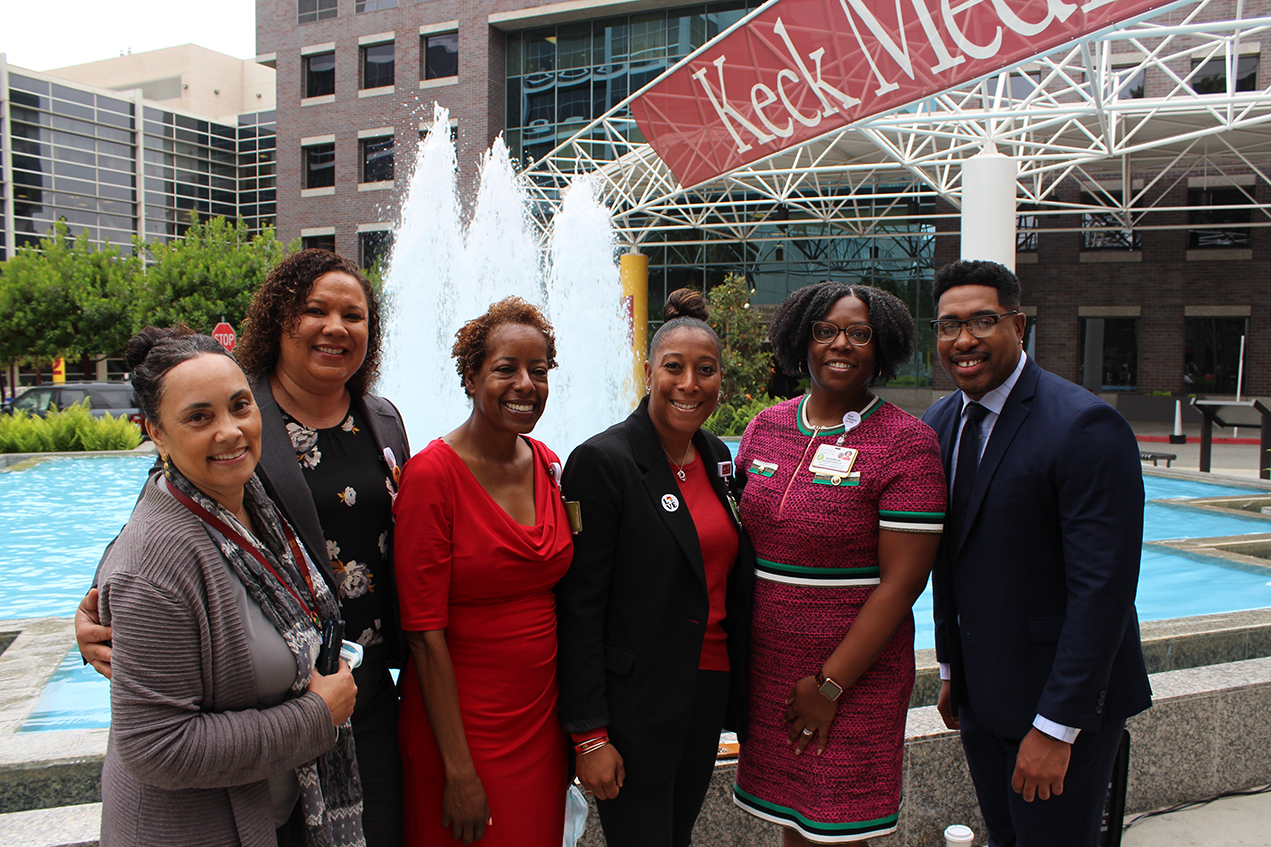In honor of the Juneteenth holiday, Keck Medicine of USC organized a number of events to commemorate the emancipation of enslaved Black people in the United States. Juneteenth is considered the longest-running African American holiday and has also been referred to as America’s second Independence Day.
“Juneteenth is a day of reflection, a day of renewal and a day filled with pride,” said Dustin Baker, co-chair of Keck Medicine’s Black Leaders and Colleagues at Keck Medicine (B.L.A.C.K. Med) employee inclusion resource group. “It is a moment in time taken to appreciate the African American experience, and is inclusive of all races, ethnicities and nationalities.”
Juneteenth, whose name derives from a combination of “June” and “nineteenth,” is commemorated on the anniversary of Union Army General Gordon Granger’s order proclaiming freedom for enslaved people in Galveston Bay, Texas on June 19, 1865. Although the Emancipation Proclamation issued in September 1862 by President Abraham Lincoln had officially outlawed slavery in states in active rebellion against the Union, enforcement of the proclamation generally fell on advancing Union troops. It would take over two years for enforcement to reach the state of Texas.
On June 17, 2021, President Joe Biden signed into law a resolution to establish June 19 as a federal holiday. The last federal holiday established in the United States was Martin Luther King Jr. Day in 1983 — making Juneteenth the first new federal holiday in almost 40 years.
“Juneteenth is an important moment for us all to reflect on the struggle for justice and freedom by African Americans,” said Joi Torrence-Hill, MHA, chief of operations for USC Norris Cancer Hospital and the executive sponsor of B.L.A.C.K. Med. “Ultimately, this is a celebration of progress, and proof that meaningful change in our society is possible.”
During the week of June 12, B.L.A.C.K. Med hosted live events at hospitals throughout the Keck Medicine health system, allowing faculty and staff to gather and reflect on the history and vital contributions of Black Americans. The events included jazz performances, trivia contests, raffles, plus offerings of soul food and other African American-influenced dishes.

Just outside Keck Hospital of USC and the surrounding health care centers, the Juneteenth and Pride flags wave together. (Photo/Julia Smith)
On June 19, employees from across the health system gathered at the Keck Hospital of USC Circle Drive fountain to witness the enterprise’s first ever Juneteenth flag-raising ceremony. With the backdrop of a calm, overcast sky, employees stood around the fountain celebrating this historic moment for both the medical enterprise and USC as a whole.
“Today, for the first time in USC history, we raise the official Juneteenth flag to honor the legacy of enslaved Black people that lived, served and died for this country,” said Baker. “The Juneteenth flag symbolizes freedom and justice for Black and African American people. The colors of the flag are similar to the United States flag because all Americans are able to understand and recognize the importance of African American history, which is American history.”
As the ceremony progressed, attendees learned about African American medical pioneers, including Rebecca Lee Crumpler. In 1864 she became the first Black woman to earn a Doctor of Medicine degree in the United States, after studying at New England Female Medical College.
Additionally, B.L.A.C.K. Med co-chairs Annette Gibson and Michelle Sullivan, PT, DPT, recited Maya Angelou’s poem “Still I Rise” during the event. Public readings of the Emancipation Proclamation and works by notable African American writers has become an essential part of Juneteenth celebrations.
“Juneteenth is also a moment where we honor the strength and resilience of African Americans who lived in the not-so-distant past,” said Torrence-Hill. “I stand here with you as the first African American woman to be the chief of operations at USC Norris. Importantly, we are here to dedicate ourselves to the work paid by our ancestors and those who sought avenues for freedom. Because of them, we stand on a foundation of greatness, and the power to change and impact this culture far beyond our imaginations.”
B.L.A.C.K. Med came to fruition in 2022 as part of an initial set of six employee inclusion resource groups. The groups are voluntary, employee-led associations where the Keck Medicine workforce can join together in light of common demographics, backgrounds and interests. The goal of the organization’s employee inclusion resource groups is to foster a culture of safety, recognition and inclusion within health system work environments.
“B.L.A.C.K. Med, like all of our employee resource groups, has forever strengthened the Keck Medicine culture,” said Shannon Bradley, chief diversity and inclusion officer for Keck Medicine. “Their efforts mark the beginning of a long and meaningful journey, one in which providers, faculty, employees and students from across the enterprise will play an essential part.”
— Matthew Vasiliauskas


